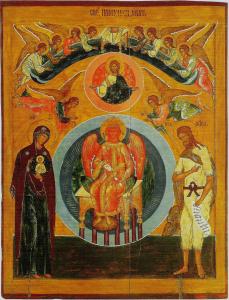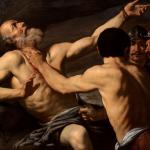 Divine Sophia, the Wisdom of God, is God, not because Sophia is a person within the Godhead but rather Sophia can be understood as the nature of the Godhead itself. This is why in Proverbs we are told to seek after wisdom; it is because in doing so, we seek after God, and when we gain wisdom, it is because we participate and receive a share of the Divine Wisdom in ourselves:
Divine Sophia, the Wisdom of God, is God, not because Sophia is a person within the Godhead but rather Sophia can be understood as the nature of the Godhead itself. This is why in Proverbs we are told to seek after wisdom; it is because in doing so, we seek after God, and when we gain wisdom, it is because we participate and receive a share of the Divine Wisdom in ourselves:
The beginning of wisdom is this: Get wisdom, and whatever you get, get insight. Prize her highly, and she will exalt you; she will honor you if you embrace her. She will place on your head a fair garland; she will bestow on you a beautiful crown (Prov. 4:7-9 RSV).
As Augustine said, our hearts are restless until we receive God. If Wisdom is what we seek, if Wisdom is what we need in order to end our restless ways, then we must understand it is God. Sophia is God and is found in the beginning in and with God. By saying Sophia is in the beginning, we must not think of beginning in some temporal fashion, but rather, the beginning is the source and foundation of all things, therefore existing outside of time and space for they come out of and from that beginning. God is the beginning of all things, the source from which they come, even as God is their goal, and therefore also the ending of all things, the Alpha and Omega of all creation. The beginning which is Wisdom therefore is not some created entity, but it is that which is eternally with God, his nature. Sophia is God, found with God, and if we find her, we will be exalted above all others because when we are with her we shall be deified, receiving a crown of glory.
What often confuses us is that when we talk about Wisdom, we think not of Sophia, the Wisdom of God, but human wisdom, which is made in the image and likeness of Sophia, making it as it were, a derivative representation of the Wisdom which is God. Human wisdom is good insofar as it helps us begin our journey to Sophia, but it becomes a barrier, indeed, a disruption within our spiritual lives if we try to hold on to it as if were anything other than the shadow of Sophia that it is. If we assume too much of our wisdom, and assume human wisdom is itself equivalent to Divine Sophia, we will become cut off from Wisdom itself and so shall suffer the consequences of our foolishness. Our wisdom is limited in nature, incapable of attaining the heights of glory which we need in order to be satisfied. Only the true Wisdom of God offers us a bounty beyond measure:
O the depth of the riches and wisdom and knowledge of God! How unsearchable are his judgments and how inscrutable his ways! (Rom. 11:33 RSV).
We find such Wisdom, the Wisdom of God, in Christ:
For I want you to know how greatly I strive for you, and for those at Laodicea, and for all who have not seen my face, that their hearts may be encouraged as they are knit together in love, to have all the riches of assured understanding and the knowledge of God’s mystery, of Christ, in whom are hid all the treasures of wisdom and knowledge (Col. 2:1-3 RSV).
For Wisdom is God, and Jesus Christ is God and man. Jesus is the Wisdom of God given voice, a Word which speaks from the depths of his own nature, opening up the knowledge and wisdom of the sages by showing the source of that wisdom in himself. Jesus, as Wisdom, will overcome anyone who would get in the way of Wisdom, overriding their foolishness by offering to everyone the key to Sophia which had previously been taken away from humanity:
Therefore also the Wisdom of God said, `I will send them prophets and apostles, some of whom they will kill and persecute,’ that the blood of all the prophets, shed from the foundation of the world, may be required of this generation, from the blood of Abel to the blood of Zechariah, who perished between the altar and the sanctuary. Yes, I tell you, it shall be required of this generation. Woe to you lawyers! for you have taken away the key of knowledge; you did not enter yourselves, and you hindered those who were entering” (Luke 11:49-52 RSV).
Those who know Jesus as man alone do not know what lies hidden beyond his humanity, all the treasures of Sophia which are his because he is God. We search for Wisdom, and, if we open ourselves up to Jesus, and join ourselves into him and become a part of his mystical body, we then are able to find Sophia and receive from her the blessings which we desire. This is what it means to say there is one mediator between God and man: that there is one person who mediates humanity and Divine Sophia so that they can come together and be made one. That person is Jesus; he knits together in love the whole of creation. We who come to Christ, therefore, must not stop with his humanity but receive, as Paul prayed, the Wisdom of God:
I do not cease to give thanks for you, remembering you in my prayers, that the God of our Lord Jesus Christ, the Father of glory, may give you a spirit of wisdom and of revelation in the knowledge of him (Eph. 1:16-17 RSV).
When we open ourselves up to Jesus, we open ourselves up to Wisdom, Sophia. Jesus is Wisdom, but he also is from Wisdom, for Wisdom is God, and Jesus is God from God, the Son of the Father. Wisdom, Sophia, can be said to be who God is in his nature. Sophia is first found in the Father who then generates the Son in Sophia, so that the Son is God from God, Sophia from Sophia. Likewise, Sophia spirates out of the Father in the Holy Spirit. Three persons, each Sophia, each the Wisdom of God, eternally Wisdom and yet differentiated in relation to their personal mode of being. Origen, in trying to read the opening of John, was close to understanding and relaying this when he reflected upon the relationship of Sophia with the beginning following the opening passage of John explained in his Gospel:
Since, then, our purpose is to perceive clearly the statement, “In the beginning was the Word,” and wisdom with the aid of testimonies from the Proverbs, has been explained to be called “beginning,” and wisdom has been conceived as preceding the Word which announces her, we must understand that the Word is always in the beginning, that is, in wisdom. Being in wisdom, however, which is called “beginning,” does not prevent the Word from being “With God,” and himself being God, not merely being “with God,” but since he is “in the beginning,” that is in wisdom, the Word is “with God.” [1]
Wisdom, Sophia, is the beginning, the eternal divine nature found in the Father and given over to the Son with the Father’s eternal begetting of the Son. The Son, the Logos, is in this beginning, in Wisdom, because the Father is Wisdom and the Son is from the Father and in the Father even as the Father is in the Son. This is why the Word, the Logos, by being in the beginning, does not hinder him being with God, for the Son is in Wisdom in and through the Father even as the Son is eternally with the Father and Spirit. The beginning discussed in the opening of John can be said to be the eternity of God, the God who is Wisdom, Sophia, which is known to us in three persons of Father, Son and Holy Spirit. Realizing the relationship of the divinity with Sophia, which Origen hints at here but does not entirely think through, would have helped Origen overcome his subordinationist understanding of the Trinity. Nonetheless, his words here and elsewhere, are invaluable because they point the way out of his quandary, and we must take the spirit of his words over the letter, taking therefore the truth of the Wisdom of God being proclaimed by Origen as the means by which we can understand the relations of the Trinity and their eternity. God is always eternally “in the beginning,” and so is always “in Sophia,” for God is always Sophia. Let us pray we can apprehend this thanks to the incarnation, so we can return to this beginning and receive the crown of Wisdom, Then we shall truly find our hearts at rest in Sophia, the love of our soul.
[Image=Sophia Icon [Public domain], via Wikimedia Commons]
[1] Origen, Commentary on the Gospel According to John Books 1-10. Trans. Ronald E. Heine (Washington, DC: CUA Press, 1989), 93-4.
Stay in touch! Like A Little Bit of Nothing on Facebook













